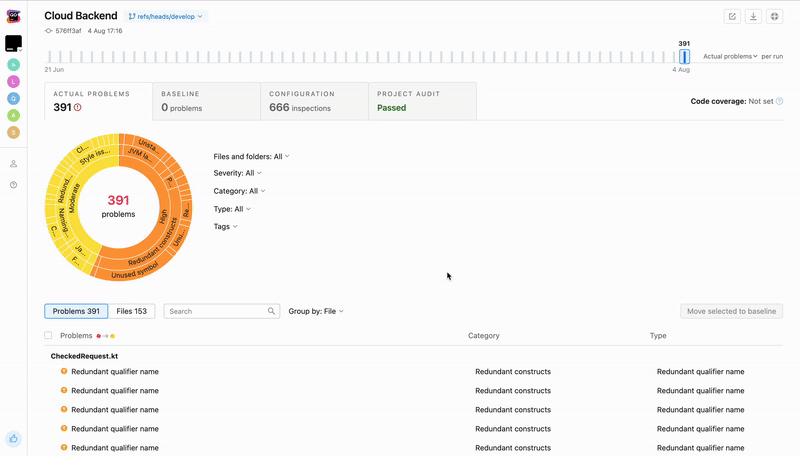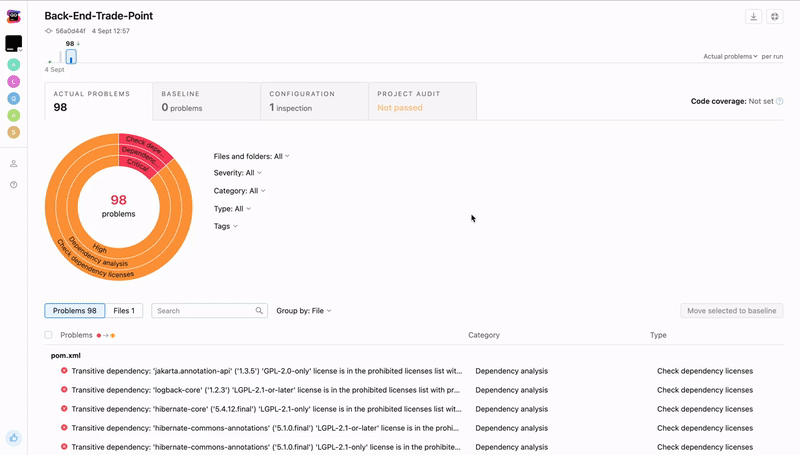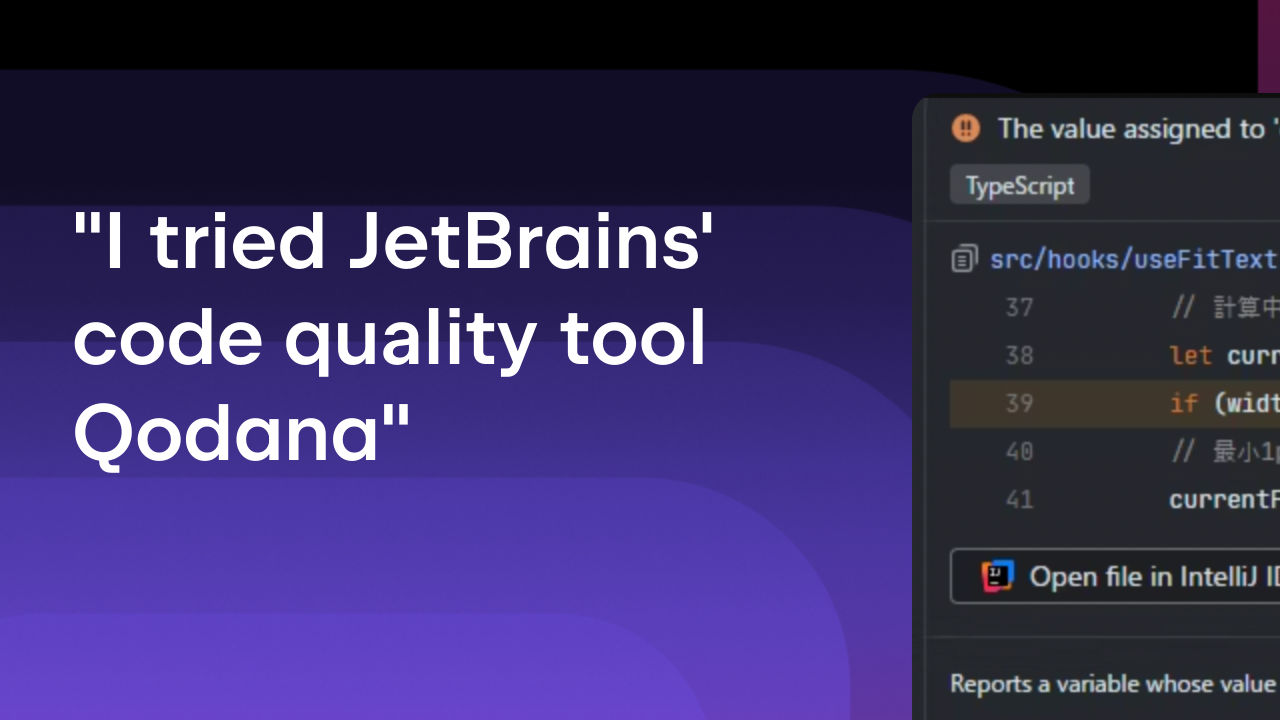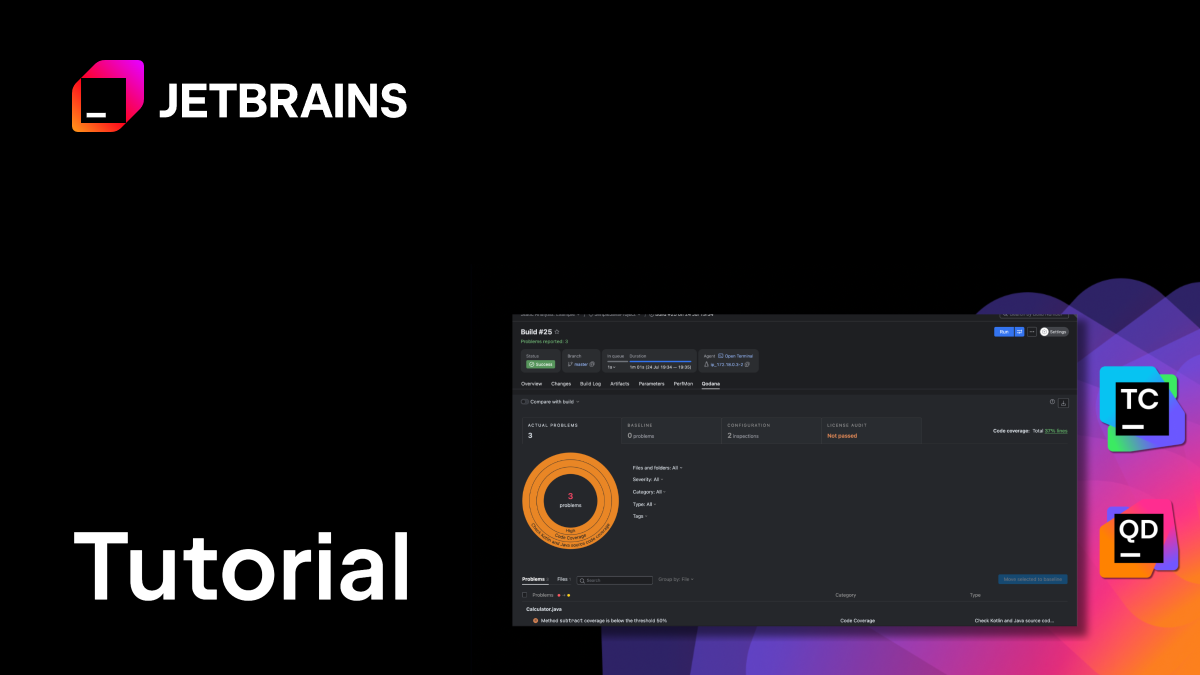Qodana
The code quality platform for teams
Automated Code Review: Enhance Your Code Review Process with Qodana
Code reviews help you strategically dig deeper into your work. They enable you to identify bugs, potential fixes, vulnerabilities, and much more to ultimately improve the quality of your source code and your knowledge of it. This can have a direct impact on team learning, project build speed and quality, and product outcomes, in addition to helping you define success.
In fact, in a previous State of Software Development report, Coding Sans found that 67.66% of software developers use peer review to ensure code quality. That number is even higher in groups of top-performing software developers, at 73.53%.
So, the argument isn’t about whether or not reviews work, or how valuable they are for internal learning, code performance, and quality. Rather, it’s about which method of implementation works best for modern teams in various use cases.
Today, many teams combine manual code reviews with automated code review using tools like Qodana to catch repetitive issues early and give humans more time for architecture, design, and edge cases.
Manual code reviews – the classic approach
Manual code reviews cover everything a human reviewer would consider, from logic flaws and potential security vulnerabilities to the overall design and architecture of the codebase. They involve assessing code without the help of automation while allowing for deep, internalized learning in context.
However, this method also comes with shortcomings and varying levels of challenge in different scenarios:
- Human error, especially when dealing with high-pressure deadlines.
- Inconsistencies due to a lack of harmonization in code quality standards.
- A lack of traceability and accountability.
- Changes being made too late in the development process.
- Too much time and effort being spent on trivial problems.
Automated code reviews – keeping issues from slipping through the cracks
With the pros and cons of manual code reviews in mind, how can we go even further to minimize human error, increase the consistency of code standards among team members, and delegate work on menial problems – all as early as possible in the development process?
This is where automated code reviews and static code analysis come into play. During an automated code review, Qodana examines your source code to identify potential defects, security vulnerabilities, and other quality issues. You can even use Qodana to apply established standards automatically. The result – your code will adhere to these standards more consistently, and basic issues will no longer require human intervention.
See how the IntelliJ team automated code reviews with Qodana
Excited to learn more about how automated code reviews can work for teams in real-world situations?

View this localization use case!
Improving quality in the development workflow
Static code analysis is used to improve the quality and reliability of software by detecting issues early in the development cycle. Whether you’re an individual developer or part of a team, you now have the opportunity to use automation to gain the following advantages:
- Time and effort saved within your development workflow.
- Improved confidence in the quality of your code.
- Knowledge transfer increases.
This is where Qodana comes into play as a static code analysis tool that helps professional development teams save time when reviewing code. It automates common, repetitive code checks, offering static analysis within a CI pipeline. Qodana can even suggest fixes for certain simple problems in your code, directly saving you time on code changes.
Qodana brings automation to code reviews
You can use Qodana’s automated reviews to simplify routine checks and free yourself up to focus more on the functionality and business logic of your application. Far fewer errors will slip through the cracks thanks to Qodana’s broad spectrum of capabilities:
Enhanced code styling & formatting: Setting Qodana up to focus on these aspects can help you maintain readability and consistency within a project.
Probable bug identification and data-flow analysis: These features enable teams to prevent issues such as null pointer dereferences, divide-by-zero errors, infinite loops, unused branches in logical expressions, errors in regular expressions, suboptimal code, resource leaks, and more.
Duplication analysis: Though often overlooked, duplication analysis is an important part of code maintenance, and it’s easy to achieve with Qodana.

Third-party license audits: The primary goal of a third-party license audit is to automatically detect and identify licenses associated with third-party components in your project. This allows you to keep track of dependencies and proactively prevent legal complications caused by the use of libraries that aren’t suitable for commercial projects.
To achieve this, Qodana third-party license audits analyze metadata, license files, and even source code comments to determine the applicable licenses.
Furthermore, Qodana provides a license inventory to ensure compliance with legal obligations and company policies. Your report can even be shared with stakeholders and used for decision-making and compliance documentation.

Enhanced security: Security is understandably a significant topic from a business, consumer, and developer perspective. Hundreds of issue types are possible, and measures should be taken to prevent them all in order to protect sensitive data. For example:
- Security vulnerabilities, weaknesses, and flaws within the source code, e.g. SQL injection, cross-site scripting (XSS), and buffer overflow.
- Security of the build chain and dependencies. Build chain attacks, such as dependency confusion or supply chain attacks, which compromise the integrity of the software by injecting malicious code or exploiting vulnerabilities in third-party components.
To mitigate these risks, you should regularly audit your dependencies, ensure that you use trusted sources for libraries and frameworks, and implement robust access controls and monitoring throughout the software development lifecycle. Qodana can help you simplify this process with the license audit.
Find your balance with Qodana
While manual reviews have their advantages, it’s important to address the challenges created by their flaws, such as the potential for human error, inconsistencies, a lack of traceability and accountability, and the possibility that changes will be made too late in the development process.
Every development team can benefit from embracing more automation and streamlining the way tedious tasks are handled, as this gives developers the freedom to focus their attention where it’s needed most. Use Qodana to increase the quality of your code and products and to learn from mistakes in context.
To get started, first claim your free Qodana trial. Then you’ll just need to create a Qodana account and connect the linter to your project or preferred CI/CD system – and you’re done! From there you can run Qodana locally or via your CI/CD pipeline and start identifying errors straight away.
If you have more questions, feel free to submit a ticket to our issue tracker (New Issue in the top right) or let us know in the comments, and keep an eye out for upcoming posts.
Subscribe to Qodana Blog updates





